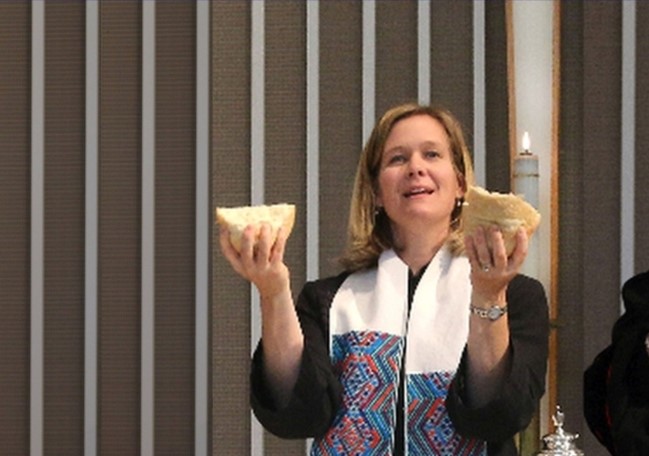
What We are Thankful for Depends on What Story We are Telling
By Rev. Lauren Ramseur, Bon Air Presbyterian Church —
Sermon: “My father was a wandering Aramean”
Deuteronomy 26:1-11
November 18, 2018
This is a story time of year. I am a mother of two children in elementary school and they are learning the history of the native peoples of Virginia and our country, the history of the land we live and learn on. And they are learning the story of the first Thanksgiving. There is some storytelling that happens around this holiday about European settlers sharing a peaceable meal with Native Americans, but it’s a complicated story.
We are good students of history and we know the complicated history of the relationship between those early European settlers and Native Americans. We know that many Native Americans were killed by diseases like smallpox that arrived with European settlers; others were murdered and others sold into slavery. There were battles and there was peacemaking. It’s a challenge to hear these complicated stories and figure out what Thanksgiving is all about.
Thanksgiving wasn’t even a holiday until Abraham Lincoln declared it one, thanks to the organizing pressure of women activists, like Sarah Hale, who wrote and advocated and wouldn’t give up. Thanksgiving was declared a national holiday to unite the country in gratitude after the end of the civil war and the abolition of slavery. What we are thankful for depends on what story we are telling.
There is another story being told this year about people coming to America in search of survival and security and a new life for their family. There are thousands who are walking north from Central America, women and children, sisters, brothers and fathers who are seeking to escape from the violence and poverty in their countries, who are risking everything desperately seeking security and survival which seems impossible in their own land. Our government has sent the military to our border to secure the wall, to protect the border from these infants, children and families. As we hear the story about these migrants in 2018, I realized again that the stories we tell ourselves matter.
Just as the Israelites were preparing to enter the Promised Land (read the story in Deuteronomy 26:1-11), Moses gathered the people and they were instructed on how to return their first fruits and their deepest thanksgivings to God. He helped them remember who they are and whose they are, whose hand brought them to this point on their journey. He recited their whole story of formation as a people and God’s deliverance and liberation in their lives. It was like opening the family photo album and retelling the story of just how we got to this place of standing knee deep in blessing. It begins this way, “My father was a wandering Aramean.” (I would say, our parents were wandering Arameans, for we know Jacob was not wandering alone).
This sentence reminds the people of Israel of their ancestors Jacob and Rachel and Leah who came from Aramea (today Northern Syria). Their thanksgiving begins by claiming their identity as a people who are migrants. Their identity does not come from a legacy of owning land, but they identified with those forced off their land because of hunger, those imprisoned in slavery, and those seeking a new life in God’s liberation.
They could have told a different story. They could have forgotten God and told a story about their strength as a people and their great survival instincts and how they pulled themselves up by their bootstraps and made it on their own. By the grace of God, they didn’t. Instead, the story that Moses teaches God’s people to tell is the story of a faithful God who leads, liberates and never lets them go. The story could have ended there too, praising God for the blessing of the Israelites alone. But by the grace of God, it doesn’t. The scripture is specific here about who is included in God’s blessing and in sharing in God’s abundance. “Then you, together with the Levites and the aliens who reside among you, shall celebrate with all the bounty that the LORD your God has given to you and to your house” (Deut 16:11).
Together with the aliens, the wanderers, the migrants, the landless, together, you shall celebrate with all the bounty that the Lord your God has given to you!
What if this prayer of thanksgiving was how we told our Thanksgiving story? Instead of silencing the truth of our history or trying to trace our history back to the Mayflower, what if we started to tell our story this time of year with this sentence, “My parents were wandering Arameans”? The stories we choose to tell about our identity matter.
Deuteronomy tells us that this is our story: My people were landless and seeking freedom, seeking a new life for their families. My people were enslaved and yearning for liberation. My people were claimed, loved and liberated by God who guides us still.
In gratitude for the harvest from the land I do not own, in gratitude for the abundance of my life that comes from God, I give thanks to God. Only solidarity with the immigrants, migrants, landless ones in my community today can I celebrate thanksgiving to our God, for my ancestors were wandering Arameans.
Our faithful God has brought us into a land flowing with milk and honey. Let us together with the stranger, the migrant, the alien celebrate the bounty that God has given us, to be shared with all of God’s people, for our parents were wandering Arameans. Thanks be to God.
Photo: Rev. Lauren Ramseur
